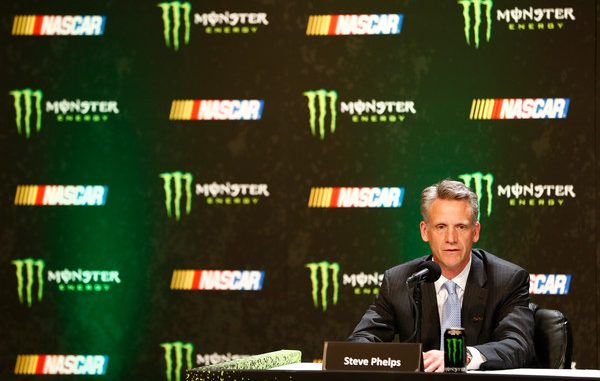
Newly named NASCAR president Steve Phelps had an optimistic message for a group of reporters gathered for a question-answer at NASCAR headquarters.
“We need to come together as a sport, and if we come together as a sport, I have no doubt this sport is going to grow,” said Phelps, whose selection as president was announced Sept. 20.
“But we have to do that. We have to have folks put self-interest aside sometimes and see what’s in the collective best interest of the sport in order for it to be healthy.”
In his new role, Phelps will have responsibility over all competition and business operations.
“For starters, I’m humbled to be in this position,” Phelps said. “There have been four other presidents of NASCAR in our 70-year history, and to be announced as the fifth—since I’m a massive fan of the sport, and I understand the history of the sport—is truly humbling.”
Elevated on April 3 to the role of chief operating officer from his previous position as executive vice president, sales and marketing, Phelps wholeheartedly embraces the collaborative spirit and process that has become the norm in NASCAR racing in recent years.
“With respect to changes I’m going to make, or a vision statement that would be different from where we’ve been, I think the path that we are on right now, which is one of industry collaboration and industry input, is one that we’re going to continue and one that I see as very important to the sport,” Phelps said.
“What Brent (Dewar) has done, first as chief operating officer and then as president of NASCAR, to try to bring the industry together—that’s something that we’re going to continue. Our sport has headwinds, for sure, and we’re addressing those headwinds head-on, and we’re going to do it as a sport. We’re going to do it with our teams, with our drivers, with our track and media partners and our sponsors.”
For those who pine for the early days of NASCAR, when founder Bill France Sr. and his son, Bill France Jr., ran the sport with what was perceived an autocratic authority, Phelps points to the importance of collaboration within a structure that gives all stakeholders their respective voices.
“There’s a school of thought out there that NASCAR should go back to the way it was, when Bill France Jr. very, very successfully ran this sport,” Phelps said. “It was Bill’s will, right? He was taking input from people behind the scenes, from drivers and team owners, but at the end of the day, it was his decision.
“Having a formal process in place with councils, I think, allows us to put things onto the calendar, have people understand when they’re going to happen, put agendas together and then collectively decide… When you look at an agenda for the drivers’ council, it will look remarkably similar to an OEM council, to a track council, to a team owner council.
“The general ideas are all the same, frankly, and the agendas are very similar. How we approach them might be a little bit different. With that said, it has allowed us to hear those voices in an environment that is private, but they can all hear what each other are saying as well. So if I’m an OEM, if I’m Toyota, I hear what Ford and Chevy are saying.”
In that spirit, NASCAR is listening to all voices when it comes to possible changes to the racing schedule. Events for 2019 already have been established an announced for all three national touring series, but for 2020, Phelps says almost all ideas will get a hearing.
“Obviously, for our ’19 schedule, our ’19 schedule is done,” Phelps said. “We announced that in April, and it’s going to be exactly the same schedule we have in ’18. So, with respect to any changes we make to the schedule moving forward, whether they’re new venues, doubleheaders, midweek racing—all these things that are being thrown around at this particular point—we’re looking at everything.
“We’ll get with our industry and get input from them, and at the end of the day, we will take all that information and cull it down, and we will make a decision that we believe is in the best interest of NASCAR.”
Phelps also promised a revamped approach in underscoring and promoting the individual races on the calendar.
“We need to make sure that the race product that we put on the track is as good as it can be, which is what we’re going to do,” Phelps said. “We do know that the race day experience or the race weekend is really important, and we’re working with our tracks to make them understand that. And we need to reinvent what I would call the event promotion, as to what that looks like.
“That gets back to a collaboration effort which we are going to see between our race tracks, NASCAR, our broadcast partners and our teams and drivers in order to promote the sport in a way that we haven’t in the past. That means really coming together and creating opportunities that reach fans and asks them to come out and see what’s going on in NASCAR.”
- NASCAR to debut new short track package at Phoenix - February 28, 2023
- The Wrench Who Stole Racing - December 16, 2022
- Matt DiBenedetto’s excellent run comes to abrupt, violent end - February 17, 2019